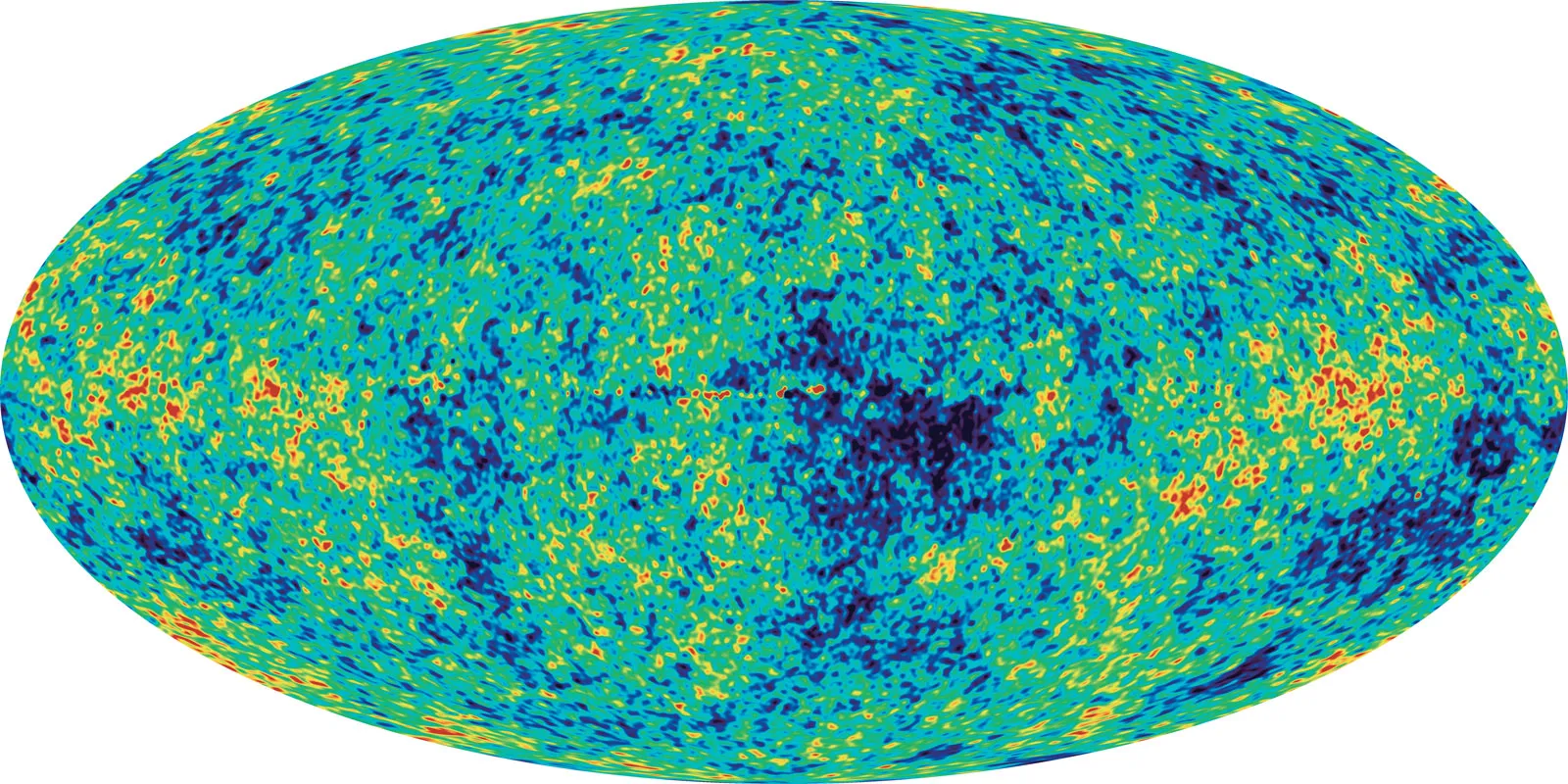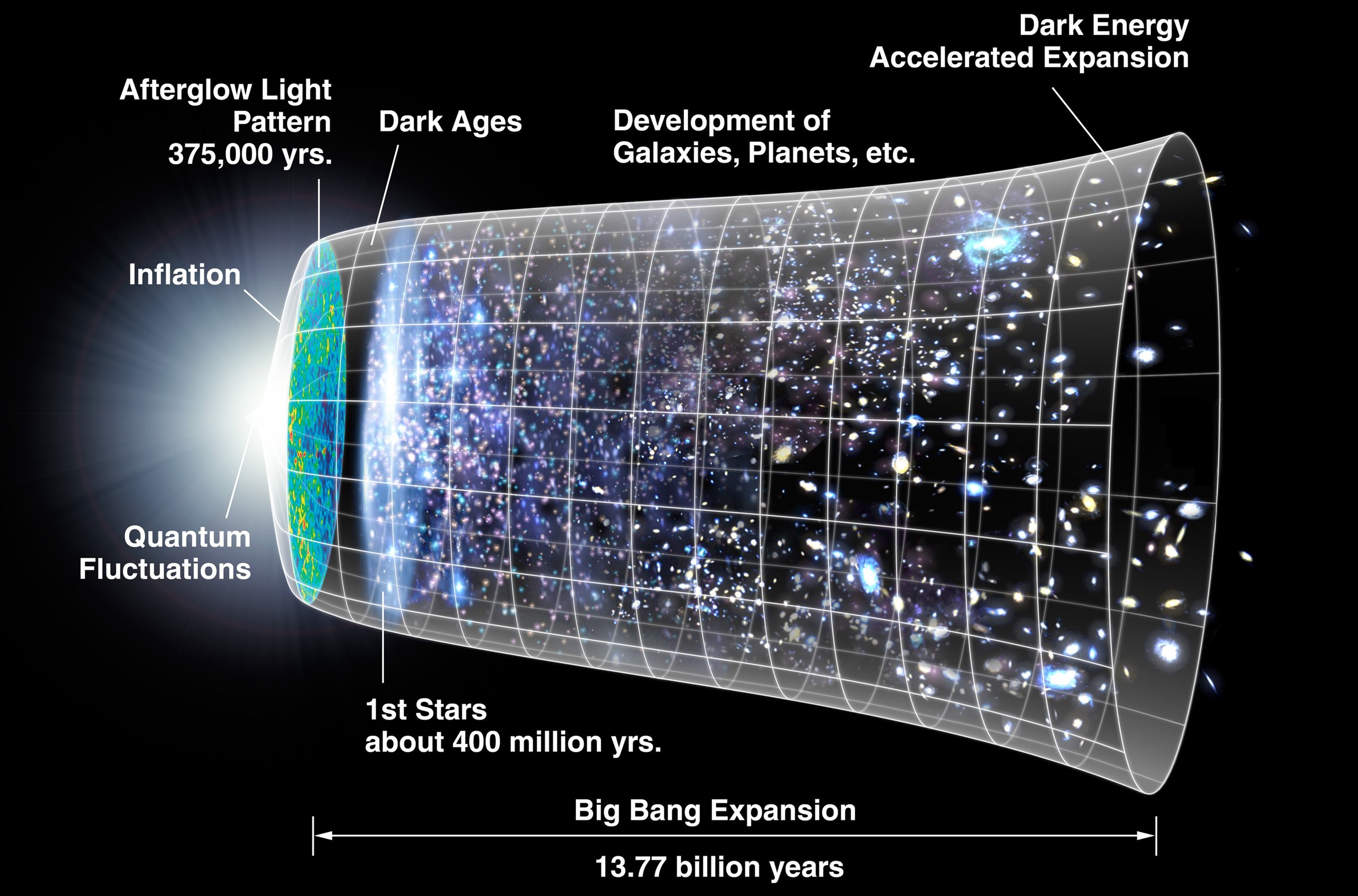The Big Bang, Cosmology, Agnosticism, and All That
Published:
I was raised Hindu but do not actively practice due to personal opinions on the socioeconomic destruction Hinduism has inflicted on marginalized groups in the South Asian subcontinent, particularly women and people in poverty (see: caste system, female infanticide in India). Developing a cosmological perspective through my studies in physics and of the Big Bang has made me comfortably agnostic. I needed a good answer for the Big Bang question in order to fall asleep at night, and because I am neither smart enough nor dedicated enough to pursue that scientifically, I turned to a God at this point, whom I choose to call Nature. And I am simply ok with Nature not sharing all her secrets on the Big Bang, but I wanted to share here what she’s revealed so far.
So basically, our whole Universe was in a hot, dense state then nearly fourteen billion years ago expansion started…
That is the first and last time you will ever see me reference The Big Bang Theory (show), which portrays physicists as just a bunch of nerds who do math all day and don’t care about anything else. That’s not me, right? RIGHT

This is not me
But what I’d like to discuss today is a bit of cosmology. Cosmology is very broadly the study of the origin and ongoing development of the Universe. This may sound almost too vague, but cosmology is a proper science and it can be remarkably precise. In fact, the demands of studying something so difficult have resulted in some of the most technologically advanced machines ever created, such as the James Webb Space Telescope, and have allowed cosmology to be one of the most precise sciences, with uncertainties in measurements of the cosmic microwave background (CMB) from the 2018 Planck Data Release being as small as 0.2% for temperature anisotropies, for example. Let me untangle all the jargon. The CMB is the oldest light that we can see in the Universe, at roughly 13.8 billion years, when the Universe reached a point where it was cold enough for light to travel away and not be obstructed by other particles and such. It’s relatively uniform, but there are little “bumps” in the CMB (anisotropies), and what’s remarkable is that (according to our best theories) where we find bumps correlates to matter abundances in the Universe today: where we find galaxies and where we don’t. The CMB is the first picture of the Universe; it’s a picture of when atoms first formed. This is known as the epoch of recombination.

A full sky map of the cosmic microwave background radiation produced by WMAP, showing the uniform glow of light produced shortly after the Big Bang that eminates throughout the Universe today. Due to the expansion of the Universe, this light has been "redshifted" into the microwave part of the electromagnetic spectrum, today. Color differences indicate temperature anisotropies, which are tiny differences in matter densities of the early Universe. According to the theory of cosmic inflation, these irregularities were the seeds of the first galaxies.
Shortly after the Beginning (or the Big Bang) which created all the Hydrogen ever, the Universe went through a very rapid period of expansion known as inflation. It’s estimated that inflation occurred between approximately 10-36 to 10-32 seconds after the Big Bang, wherein the Universe expanded about 1026 to 1030 times its original size. Imagine writing these numbers down; they are incomprehensibly small / large! Fun fact: I’ve actually been in the same room as the creator of the theory of cosmic inflation, Alan Guth, at MIT sometime last spring. I was too scared to talk to him.
Inflation is just a theory, and in fact I think that it’ll be quite impossible (at least any time soon) to definitively prove inflation because we cannot see past the CMB, which came after inflation. There are other ways, such as with gravitational waves, but I think it’s a long-shot. What inflation does for physicists is provide a reasonable explanation as to why the Universe today looks so similar all around us, regardless of where we look — otherwise known as the cosmological principles of isotropy and homogeneity. The CMB shows us that everything in the Universe was roughly the same temperature, but you find that when you naively wind back the clock, point A and point B on opposite sides of the CMB could have never been in “causal” contact with each other, atleast without a mechanism like cosmic inflation allowing them to. I don’t think that there are many people out there who deny or doubt inflation happened, much like Stephen Hawking’s theory of black hole radiation. These theories are too elegant and too simple to be reasonably contested.

An abridged timeline of modern cosmology.
After inflation, things got pretty boring: some protons and neutrons started to form, and other particles, and the Universe was basically a hot particle soup. Fast forward to roughly 380,000 years after the Big Bang when things were cool enough for light to escape - and not just zigzag around this particulate soup - and we have the CMB. After that, stars and galaxies gravitationally did their thing as the Universe entered its matter-dominated epoch. There’s some more interesting things like the radiation-dominated epoch, and the Friedmann equations, and the Hubble parameter, and the Hubble Tension, and the cosmological constant, and dark matter, and dark energy, and whether dark energy is actually the cosmological constant, and so on — but there is not enough time to discuss this all. What I’d like to spend some more time on is the Big Bang itself, and the philosophical implications that it imposes.
The predominant narrative in the early 20th century was that the Universe was eternal. It was always there, and it will never end. Einstein was an avid supporter of this. This is actually a comforting thought, at least to me. But there was some remarkable observational evidence from Edwin Hubble in the 1920’s that showed all galaxies are moving away from us, regardless of where or when we look. Keep in mind that because the speed of light is sooooo slow compared to cosmological distances, as we look at more distant objects, we are in a sense looking back in time. And what Hubble’s discovery showed is that the Universe is expanding. And if something is expanding, then certainly it was much smaller in the past, and in fact it had to have started with a cosmological singularity which we now call the Big Bang. Ta-Da.
Another fun fact: The cosmological principles I mentioned above, that of homogeneity and isotropy, actually imply that the Big Bang happened everywhere in space, simultaneously. If I observe all galaxies everywhere to be moving away from me, then a galaxy anywhere will observe all galaxies everywhere to be moving away from it, regardless of when it is in time (I know I’m referencing time as a place, and this isn’t a complete abuse of jargon, as space and time are actually unified into spacetime, which in math-language is a four-dimensional manifold). Kind of overwhelming, I know, but that is all of cosmology.
The accelerated expansion of the Universe which we observe today has interesting implications for how the Universe may eventually end. Katie Mack has a really good book on this topic, "The End of Everything (Astrophysically Speaking)".
The fact that the Universe had a beginning is frankly, terrifying. If you don’t think that is terrifying, please think about this more. And surely physicists must be wondering what happened exactly at the Big Bang, or before, or dare I ask — what prompted the Big Bang? The scientific method breaks down with such questions; there are physicists out there who study this question and have answers that they believe, usually having to do with multiple universes and foams and bubbles and other words that frankly sound like they don’t belong in science. But what if you are not one of these select few physicists? What if you’re just a mediocre one like me?
- The laws of nature are but the mathematical thoughts of God. - Euclid
These theories (such as string theory) cannot be supported with experimental evidence in the near or foreseeable future. Many physicists, including myself, turn to philosophy or religion with this question of the Beginning. In disagreement with the popular stereotype that scientists, particularly physicists, are automatically atheists — I would argue that many must turn to some other doctrine when entertaining the idea of what caused the Big Bang.
Whether it’s God in a biblical sense, or an idea of God, or just something you call Nature, the scientific acceptance of the Big Bang Theory, to me, is an instance of the scientific community giving up the reins to “God”. And this was not so easily done, but it’s a testament to how sophisticated our science has become — we have pushed the scientific method to its absolute limits, and have arrived at a question that we cannot reasonably pursue using it. That is, the question of why there is something rather than nothing.
